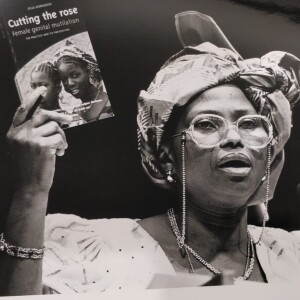
Monday Sep 18, 2023
Meserak ‘Mimi’ Ramsey: FGM– Harmful Cultural Practices (Ghana)
“And I knew it then, I am in trouble with this man. But, I don't have no voice. I was 18. He was 35. I was struggling to finish high school. He was going for his PhD. And women don't have no voice. And I didn't.”
“Female genital mutilation is not a harmless cultural practice, but a major cause of permanent physical change and death to women and girl children in the society in which it is practiced.”
“I am 43 years old. I am still suffering. FGM robbed my childhood. Robbed my teenage life. Robbed my adult life. Robbed my health. Robbed my sexuality.”
“Please, it concerns all race, all women, and all men to get involved. Please don't say, "I'm white. It doesn't concern me. I'm Chinese, it doesn't concern me." Yes, this is about children. When it comes to, when it's children, it concerns all human beings, all race.”
Abstract:
“Female genital mutilation is not a harmless cultural practice, but a major cause of permanent physical change and death to women and girl children in the societies in which it is practised. Education against the practice should be part of grassroots health campaigns. I will discuss the different forms of FGM, its repercussions and the areas where it is carried out, including its appearance in Western countries.
Over 114 million female infants, adolescents and women in over 41 countries suffer the practice as part of donning a gender role that is deeply disadvantageous and dishonouring to us. Female genital mutilation is child abuse; it is an abuse of human rights. This custom must be revealed as the cruel and sexist abuse that it is. FGM is not religious, it is not required by Islam, Christianity or Judaism. Although followers of all three religions practice it, FGM is a girl child’s emergency human rights issue. We do not know how many children die in the bush as a result of genital mutilations as no death records are kept in the rural areas. FGM is seen by some as a patriarchal mechanism for the repression of women’s sexuality. I have decided to make the fight against FGM one of my priorities here in the US and my homeland Ethiopia.
Mimi suffered genital mutilation at the age of 6. She moved to the United States after entering into an arranged marriage at the age of 20. Since February 1994, Mimi has been working hard in the campaign against Female Genital Mutilation (FGM). Since 1994, Mimi has emerged as a leading activist in African immigrant communities in the United States. In her home town in California, Mimi frequently visits African shops, beauty parlours, community centres and local clinics to spread the word about FGM. She has managed to convince many African women to stop the harmful practice, by sharing her own pain and suffering.”
We have not been able to find any further information on Mimi. If you know about her work or life since 1996, please get in touch.
No comments yet. Be the first to say something!